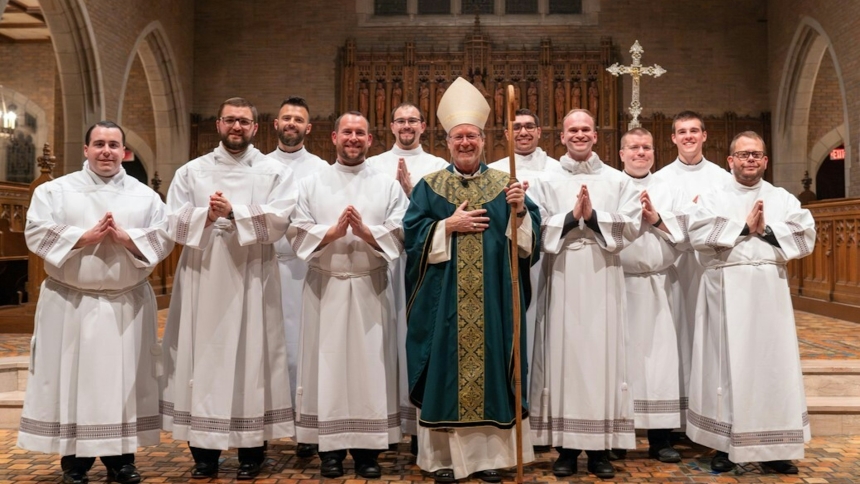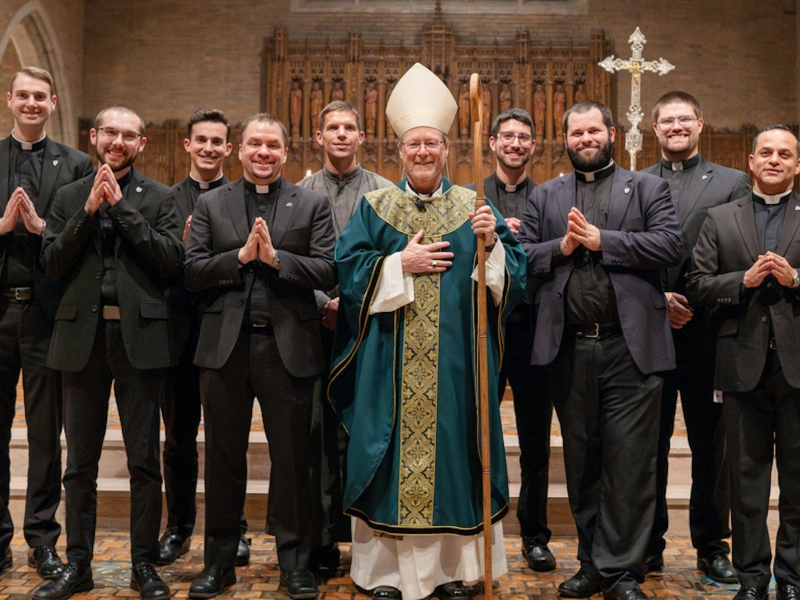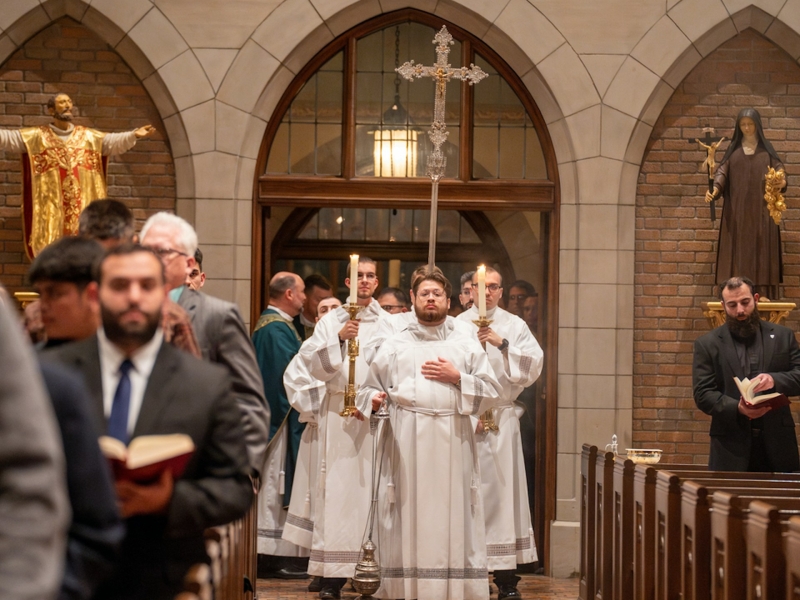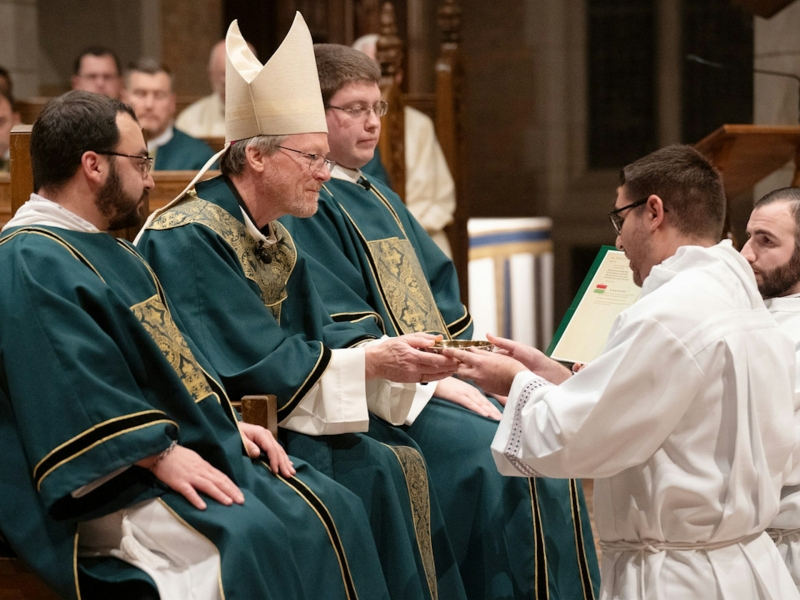
Congratulations to Diocese of Lansing seminarians Joshua Bauer, Ryan Ferrigan and Peter Randolph upon being installed as acolytes, November 8, at Sacred Heart Major Seminary in Detroit, and also to fellow diocesan seminarians James Bonar and Paul Keenan upon becoming lectors. Deo gratias.
In a liturgy steeped in tradition and representative of the solemnity of their vocation, a total of 20 seminarians received new ministries as they took up the next step on their journey toward the priesthood at Sacred Heart Seminary.
Gaylord Bishop Jeffrey J. Walsh presided over the Mass of installation for the lay ministries of lector and acolyte in Sacred Heart’s chapel as friends, family and fellow seminarians prayed over the men whom the Church is preparing in their formation for ordination.
Nine second-year seminarians were installed in the ministry of lector, while 11 third-year seminarians were installed as acolytes.
The two ministries — which until 1972 were considered “minor orders” — represent a significant step in the formation of a seminarian, following candidacy, which is conferred upon entering the school of theology.
Pope Saint Paul VI reformed the ministries of lector and acolyte in the modern Church with his 1972 apostolic letter Ministeria Quaedam, directing that they be given to candidates for holy orders as part of their formation.
The lay ministries confer on the seminarians an instituted office with responsibilities that, in the modern Church, are often filled by volunteers — for instance, serving at the altar or proclaiming Scripture during Mass — highlighting the nature of their vocation and commitment to growing as disciples of Christ and servants of his Church.
While the ministries of lector and acolyte are open to all laypeople, they are most commonly conferred upon candidates for ordination as a way to reflect their deepening formation and service to the Gospel and the sacraments.
Among the roles fulfilled by a lector include carrying the book of the Gospels and reading from the ambo during Mass, while acolytes assist in the preparation of the altar and aid the priest or deacon in the celebration of the liturgy.
Importantly, both roles carry an outward, communal dimension as a sign of love and example of faithfulness and devotion to God's word and sacrament, Bishop Walsh said in his homily.
“It is a happy occasion that we gather tonight for this recognition that is a step in your seminary formation, but also because the Lord is present in the holy Eucharist, and we gather always for these important occasions around the altar of the Lord,” Bishop Walsh told the seminarians. “We’re fed by both the word of God in the sacred Scriptures, and by the Bread of Life that always nourishes our soul and sends us off on mission.”
The ministries of lector and acolyte are both significant in that they are reminders of the two ways in which Christ meets his people — through the sacred Scriptures and through the holy Eucharist, Bishop Walsh said.
The ministries of lector and acolyte are both significant in that they are reminders of the two ways in which Christ meets his people — through the sacred Scriptures and through the holy Eucharist, Bishop Walsh said.
Bishop Walsh reflected upon the Second Vatican Council’s dogmatic constitution on divine revelation, Dei Verbum, in particular the interconnectedness between the Scriptures and the liturgy, both of which point to Jesus and are signs of his love for God's people.
“The Church has always venerated the divine Scriptures, just as she venerates the Body of the Lord, since especially in the sacred liturgy, she unceasingly receives and offers to the faithful the Bread of Life, both from the table of God’s word and Christ’s body,” Bishop Walsh said.
The ministries of lector and acolyte, Bishop Walsh continued, are in a special way designed to reflect the radiance of God's love in both word and sacrament, an appropriate role for men preparing for the priesthood.
“How important these ministries are in the life of the Church,” Bishop Walsh said. “We can’t take them for granted or put them by the wayside or not prepare well for them. How important it is for us to meditate before proclaiming the word, before we serve at the altar, to know what we’re doing and why we’re doing it — to understand the importance of our witness for others who are gathered for the liturgy as we are all striving to come closer in communion with the Lord.”
Bishop Walsh encouraged the seminarians as they continue their formation process “to continue to be diligent in your study, in your receptivity, in your prayerfulness, and in your love for God and for His Church, His people.”
Acolytes: The following third-year seminarians were installed in the ministry of acolyte:
• Lizandro Jose Barba (Archdiocese of Detroit)
• Joshua Mark Bauer (Saint Elizabeth, Tecumseh, Diocese of Lansing)
• Mark Joseph Beukema (Diocese of Marquette)
• Ryan Scott Ferrigan (Saint Martha, Okemos, Diocese of Lansing)
• Karl Richard Finkbeiner (Archdiocese of Detroit)
• Drew Thomas Langton (Diocese of Marquette)
• James Dempsey Musgrave III (Archdiocese of Detroit)
• William Brennan O’Donnell (Diocese of Gary)
• Peter Casey Randolph (Christ the King, Ann Arbor, Diocese of Lansing)
• Tyler James Rivard (Diocese of Marquette)
• Daniel Sean Whalen (Archdiocese of Detroit)
Lectors: The following second-year seminarians were installed in the ministry of lector:
• Christopher Jacob Belanger (Diocese of Gaylord)
• Charles James Bemiss (Archdiocese of Detroit)
• James Burleson Bonar (Christ the King, Ann Arbor, Diocese of Lansing)
• Paul Edward Keenan (Saint John the Baptist,Ypsilanti, Diocese of Lansing)
• Joseph Gerald Lennon (Archdiocese of Detroit)
• Bro. Gregory Patrick Rice, SOLT (Society of Our Lady of the Most Holy Trinity)
• Anthony Sean Riley (Archdiocese of Detroit)
• Hector Albeiro Saldarriaga Cadavid (Diocese of Kalamazoo)
• Ethan Douglas Wilcox (Diocese of Marquette)
Additional reporting by Michael Stechshulte | Detroit Catholic. Photos by Valaurian Waller | Detroit Catholic.



